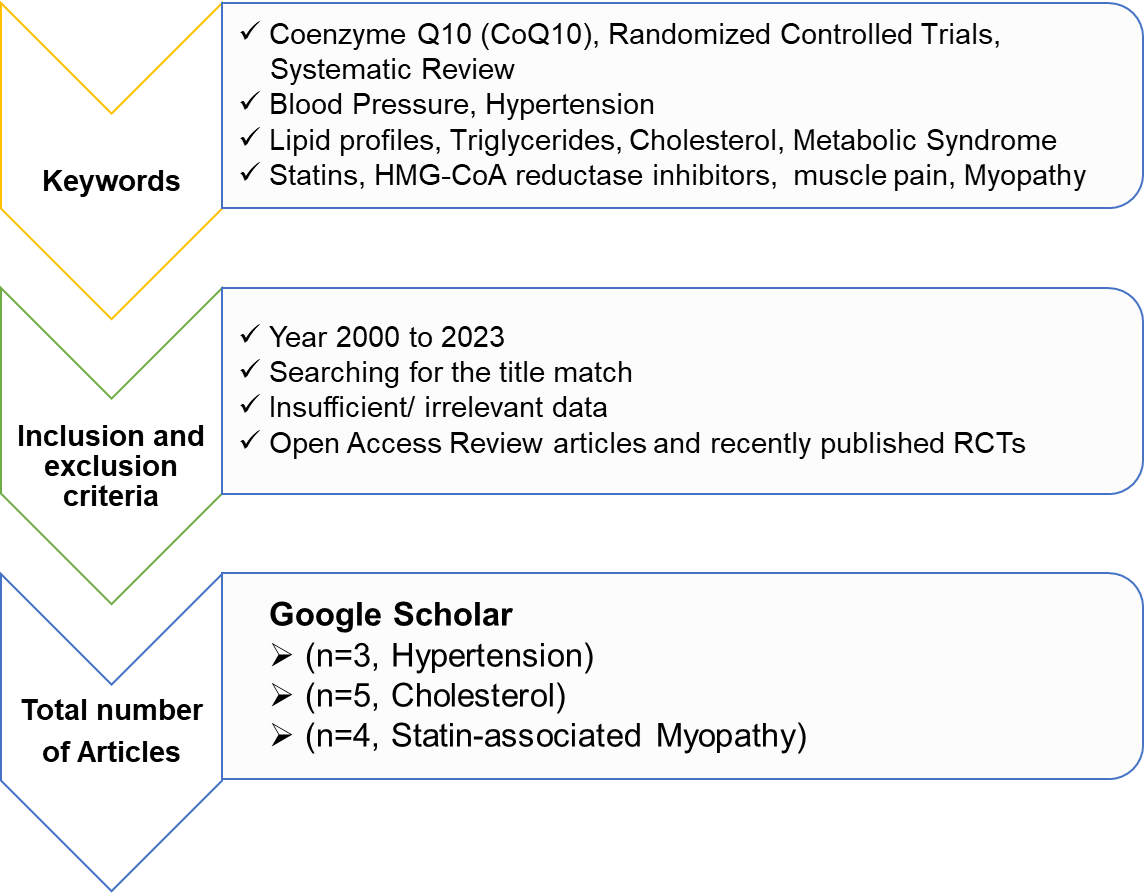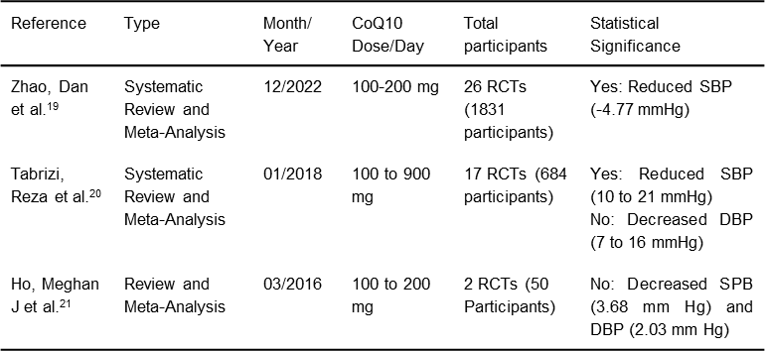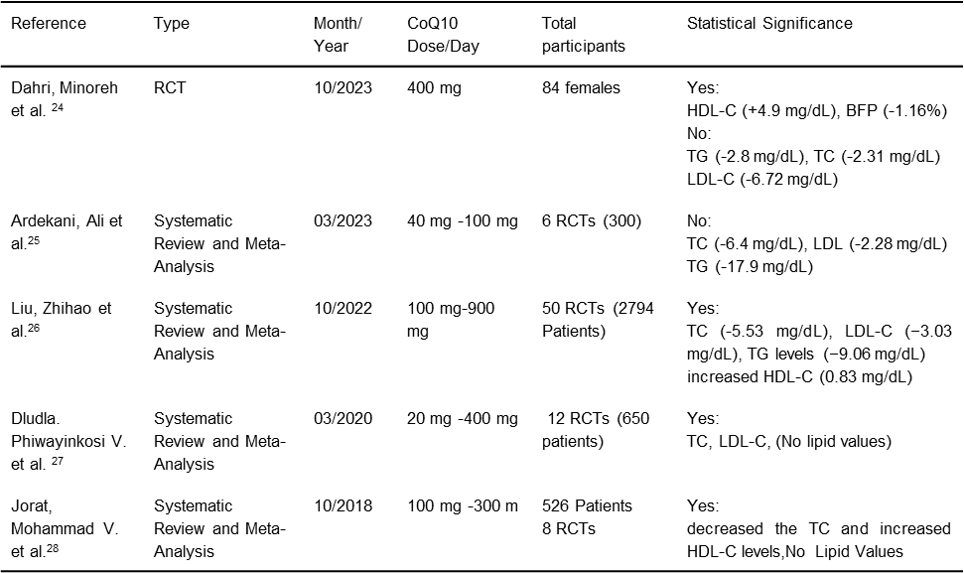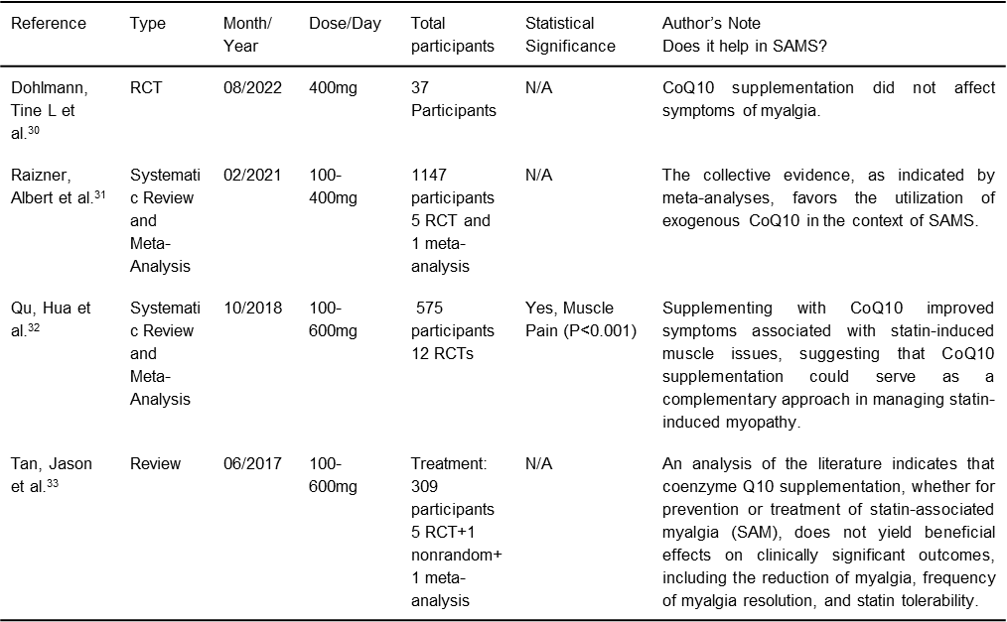Abstract
Hypertension constitutes a major factor contributing to premature deaths globally, affecting over 30% of the adult population worldwide with an approximate figure of 1.3 billion people. Elevated cholesterol levels escalate the risks of heart disease and stroke, with a third of worldwide ischemic heart disease cases attributed to high cholesterol and affects 39% of adults globally. In this study, we will delve deeper into Coenzyme Q10, compiling information regarding its various applications supported by clinical data to guide medical professionals in sound reasoning to use Coenzyme Q10 to help better various ailments. In January of 2024, we used Google Scholar to search for various articles by using specific keywords for each criterion from which we selected a total of 12 articles on the topics of Hypertension, High Cholesterol (Dyslipidemia), and Statin Associated Myopathy Symptoms with Coenzyme Q10 usage in each. Current evidence suggests that CoQ10 supplementation has a significant impact on systolic blood pressure and has a positive effect on cholesterol levels. CoQ10 supplementation may help alleviate statin-associated muscle pain but further research is needed to establish more conclusive findings (Graphical Abstract). Further well-designed large Randomized controlled trials (RCTs) are warranted to establish the health benefits, optimal dosages, and duration of supplementation. Additionally, it is always advisable to consult with a healthcare professional before starting any new supplementation regimen.
Keywords: Coenzyme Q10 (CoQ10), Hypertension, Dyslipidemia, Statin Associated Myopathy
Introduction
Hypertension, affecting over 30% of the adult population worldwide, constitutes a major factor contributing to other deadly diseases such as chronic kidney disease, stroke, and heart failure leading to death. Regrettably, only about 1 in 5 adults with hypertension successfully manage to control it.1 Elevated cholesterol levels escalate the risks of heart disease and stroke, with a third of worldwide ischemic heart disease cases attributed to high cholesterol. The overall impact of raised cholesterol is estimated to lead to approximately 2.6 million deaths. Globally, nearly 39% of adults have elevated total cholesterol.2 Statins lower cholesterol levels and improve cardiovascular outcomes in patients who can tolerate them. Unfortunately, statin-associated muscle symptoms (SAMS) force patients to stop taking them and deprive them of the health benefits of this class of drugs. Coenzyme Q10, often referred to as CoQ10, is a vital compound that plays a fundamental role in the energy production processes within the cells of our body.3 It is a naturally occurring, fat-soluble substance found in every cell and tissue, with particularly high concentrations in organs that require significant amounts of energy, such as the heart, liver, and kidneys. Beyond its role in cellular energy production, Coenzyme Q10 also acts as a potent antioxidant which helps to protect cells from oxidative damage and support overall health. It has also been seen to help reduce blood pressure, help reduce body fat percentage, help in overall cholesterol health, and have cardiovascular benefits. This remarkable molecule has garnered attention in recent years for its potential health benefits, ranging from improving cardiovascular health to supporting skin vitality, making it a subject of ongoing research and interest in the field of nutrition and wellness.4 Coenzyme Q10, also known as ubiquinone, features a side chain with 10 isoprenoid units. In its natural form, all double bonds of the isoprenyl groups are in the E- configuration. This compound serves as a human metabolite, a ferroptosis inhibitor, and an antioxidant. Ubidecarenone, another name for coenzyme Q10, is classified as a 1,4-benzoquinone.
We have taken importance and studied the pharmacokinetics of Coenzyme Q 10 extensively. Pharmacokinetics refers to the study of how a substance, such as Coenzyme Q10 (CoQ10), is absorbed, distributed, metabolized, and eliminated by the body. Understanding the pharmacokinetics of CoQ10 is essential for determining its dosing, bioavailability, and potential therapeutic effects.5 CoQ10 is a fat-soluble compound and is better absorbed in the presence of dietary fat.6 Absorption of CoQ10 in the gastrointestinal tract can be slow and variable, influenced by factors such as the formulation of the CoQ10 supplement and the presence of food. CoQ10 is primarily absorbed in the small intestine.7 After absorption, CoQ10 is transported in the bloodstream, primarily bound to lipoproteins and incorporated into cell membranes. It has a wide distribution in the body, with higher concentrations found in organs and tissues with high energy demands, such as the heart, liver, and kidneys.8 CoQ10 undergoes minimal metabolism in the body. It can be converted to its reduced form, ubiquinol, in tissues, which is considered the more active antioxidant form.9 CoQ10’s bioavailability can be limited, especially when taken in conventional supplement forms. Since CoQ10 is classified as a dietary supplement that lacks strict standards regarding various formulations and delivery methods, CoQ10 marketed as ubiquinol supplements, lipid-based carriers, or nanotechnology, have been developed to enhance CoQ10 bioavailability and absorption.10 CoQ10 levels tend to decrease with age, potentially affecting its pharmacokinetics.11 Certain medical conditions, such as cardiovascular disease and mitochondrial disorders, may alter CoQ10 metabolism and distribution.12 Some medications, such as statins, which are used to lower cholesterol, can reduce CoQ10 levels in the body.13 CoQ10 supplements are commonly used to support cardiovascular health, as CoQ10 plays a crucial role in energy production in the heart.14 CoQ10 has been studied for various therapeutic applications, including its potential benefits in managing heart disease, hypertension, migraines, and certain neuromuscular disorders.15 The US FDA has a section for dietary supplements, but it is generally unregulated as these supplements are to “help” and not for the “intention-to-treat” or “cure” of any disease or ailment. Along with this, the supplement has to consist of natural products excluding any synthetic ingredients. They have strict labeling and advertising policies as well regarding the nature of these products as well.16
In summary, Coenzyme Q10 exhibits complex pharmacokinetics characterized by absorption influenced by dietary factors, distribution to various tissues, minimal metabolism, and elimination primarily through the bile.17 Its bioavailability can vary depending on the formulation used. Understanding these pharmacokinetic principles is essential for optimizing CoQ10 supplementation and its potential health benefits. Side effects of Coenzyme Q10 are very minimal and mild. The mild effects that have been noticed are insomnia, upset stomach, nausea, and vomiting.14 Other than that, loss of appetite can be seen as well as reduction of blood pressure, which is a current study aspect.18 It is advisable to consult a healthcare professional before starting any new supplementation regimen, especially if you have underlying medical conditions or are taking medications that may interact with CoQ10.
Methods
 The primarily selected articles were review articles or meta-analyses with a few RCTs. These were selected by set criteria of the presence of Clinical Data, Coenzyme Q10 used as a part of the study group, age of the article, accessibility of the article, completion of the article, and relevance to the main search criteria as listed in Figure 1. No exclusions were placed based on country of publication, final result, or number of test subjects.
The primarily selected articles were review articles or meta-analyses with a few RCTs. These were selected by set criteria of the presence of Clinical Data, Coenzyme Q10 used as a part of the study group, age of the article, accessibility of the article, completion of the article, and relevance to the main search criteria as listed in Figure 1. No exclusions were placed based on country of publication, final result, or number of test subjects.
Fig. 1 Flow Diagram of the literature search process
Results and Discussion
Effect of Coenzyme Q10 Supplementation on SBP and DBP in Patients with Hypertension, Lipid Profiles in Patients with High Cholesterol or Dyslipidemia, and statin-associated muscle pain are presented in Table 1 (a-c).
Table 1(a): Effect of Coenzyme Q10 Supplementation on SBP and DBP in Patients with Hypertension

**SBP: systolic blood pressure; DBP: diastolic blood pressure. In this table, there were a total of 5 articles used of which 3 were Full Open Access Review Articles, 1 was an article with an abstract only, and 1 update to a previously published Review Article.19–21 The article by Rosenfeldt, Franklin et al.22 was a Systematic Review using 8 RCTs and Decreased SBP (16 mm Hg) and DBP (10 mm Hg).
Coenzyme Q10 can boost the generation of essential antioxidants, like superoxide dismutase—an enzyme that effectively lessens vascular oxidative stress in individuals with hypertension.23 The data gathered from these studies provide strong reasoning that Coenzyme Q10 may prove to benefit patients with hypertension as a supplement. From these studies, it was seen that the decrease in systolic blood pressure was greater than the effect of Coenzyme Q10 on diastolic blood pressure. Although the overall outcome was varied in definitive conclusion, it can be seen that overall Coenzyme Q10 may provide a health benefit for the reduction of blood pressure as a supplement.
Table 1(b): Effect of Coenzyme Q10 Supplementation Lipid Profiles in Patients with High Cholesterol or Dyslipidemia

**TC: Total Cholesterol; LDL-C: Low-density Lipoprotein Cholesterol; HDL-C: High-density lipoprotein cholesterol; TG: Triglyceride; BFP: Body Fat Percentage. In this table, there were a total of 5 articles used of which 4 were Review Articles and 1 RCT.24–28
Increased levels of cholesterol, especially elevated low-density lipoprotein (LDL) cholesterol, pose a notable risk for heart disease. While statin medications are frequently recommended to reduce cholesterol, some individuals may experience side effects.29 As a result, there is a growing interest in alternative approaches, including the consideration of Coenzyme Q10 supplementation. Coenzyme Q10 helps cholesterol health by lowering lipid peroxidation levels by reducing pro-oxidative compounds.23 Although the exact mechanism and function of Coenzyme Q10 in this role is still uncertain, the potential health benefit of Coenzyme Q10 is quite apparent. The data gathered from these studies provide strong reasoning that Coenzyme Q10 may prove to benefit patients with high cholesterol and provide cardiovascular benefits as a supplement.
Table 1(c): Effect of Coenzyme Q10 supplementation in patients with Statin Associated Myopathy Symptoms (SAMS)

***SAMS: Statin Associated Myopathy Symptoms; In this table, there were a total of 4 articles used of which 3 were Review Articles and 1 RCT.30–33
The most commonly found medication to help treat high cholesterol are the “statin” drugs. Many people can take these drugs with no issue, but many people report muscle pain or Statin Associated Myopathy Symptoms (SAMS). In clinical practice, all statins work by inhibiting the HMG-CoA reductase enzyme, thereby reducing endogenous cholesterol synthesis, and potentially leading to statin-associated muscle symptoms (SAMS). The reductions in protein prenylation, CoQ10, and cholesterol levels have been linked to the occurrence of SAMS.34 In this study, we had attempted to identify if replenishment of Coenzyme Q10 would resolve SAMS or help benefit patients undergoing treatment to help reduce the pain.
The data gathered from these studies provide some evidence that Coenzyme Q10 may prove to benefit patients with SAMS. Two of the systematic review and Meta-Analysis articles are supported by a large sample size of 1147 and 575 participants, respectively, and they both support the use of CoQ10 in SAMS but only one is statistically significant. However, the remaining two articles have a total participant count of less than 350 and did not favor the use of CoQ10 in SAMS.
Table 2: Simplified Compilation of Data of Systematic Reviews/Meta-Analysis for Coenzyme Q10 Supplementation

(A) During this RCT, preliminary studies were done in which Coenzyme Q10 supplementation was investigated and mixed results were found. Some studies report that Coenzyme Q10 supplements did not affect SAMS.35–39 Other studies have reported a reduction of symptoms in SAMs.40,41 These conflicting results lead to uncertainty on the effect of Coenzyme Q10 supplementation for SAMs.
(B) In this Systematic Review/Meta-Analysis, studies were done in which Coenzyme Q10 supplementation was investigated and mixed results were found. Some studies report that Coenzyme Q10 supplements did not affect SAMS.36,38,42 Other studies have reported a reduction of symptoms in SAMs.32,40,43 These conflicting results lead to uncertainty on the effect of Coenzyme Q10 supplementation for SAMs.
(C) In this Systematic Review/Meta-Analysis, studies were done in which Coenzyme Q10 supplementation was investigated and mixed results were found. Some studies report that Coenzyme Q10 supplements did not affect SAMS.37,42 Other studies have reported a reduction of symptoms in SAMs.36,40,41,44,45 These conflicting results lead to uncertainty on the effect of Coenzyme Q10 supplementation for SAMs.
Conclusions
Coenzyme Q10 (CoQ10) has emerged as a potential agent due to its properties as an antioxidant and its role in cellular energy production. Coenzyme Q10 (CoQ10) has shown promise in its potential to impact blood pressure and cholesterol levels. While research suggests that CoQ10 supplementation may help lower blood pressure and improve the overall cholesterol profile, it is important to remember that it should not replace prescribed medications or medical advice. If you have hypertension or high cholesterol, consult with your healthcare provider to discuss the potential benefits and risks of CoQ10 supplementation as part of your overall treatment plan. Additionally, it is important to note that individual responses may vary, and it may take time to see noticeable effects. Regular monitoring of blood pressure and cholesterol levels, along with ongoing communication with your healthcare provider, is essential for optimal management of these conditions. Coenzyme Q10 use in SAMS may help alleviate statin-associated muscle pain but further research is needed to establish more conclusive findings. Further well-designed large RCTs are warranted to establish the health benefits, optimal dosages, and duration of supplementation. Additionally, it should be noted that CoQ10 supplements are not approved by the U.S. Food and Drug Administration for the treatment of any medical condition. It is always advisable to consult with a healthcare professional before starting any new supplementation regimen.
Acknowledgments
The authors are thankful to Dr. Randy Mullins, Associate Professor of Pharmacy Practice and Department Chair of the Pharmaceutical Sciences Department, and Dr. Md. Mazharul Islam Chowdhury, Postdoctoral Faculty in the Department of Pharmaceutical Sciences at Appalachian College of Pharmacy for their time and effort in reviewing the manuscript and providing inputs.
Conflict of interest
The authors declare no Conflict of interest.
References
- Hypertension. https://www.who.int/news-room/fact-sheets/detail/hypertension [Link]
- Indicator Metadata Registry Details. https://www.who.int/data/gho/indicator-metadata-registry/imr-details/3236 [Link]
- Saini R. Coenzyme Q10: The essential nutrient. J Pharm Bioallied Sci. 2011;3(3):466-467. doi:10.4103/0975-7406.84471 [PubMed]
- Testai L, Martelli A, Flori L, Cicero AFG, Colletti A. Coenzyme Q10: Clinical Applications beyond Cardiovascular Diseases. Nutrients. 2021;13(5):1697. doi:10.3390/nu13051697 [PubMed]
- Bhagavan HN, Chopra RK. Coenzyme Q10: absorption, tissue uptake, metabolism and pharmacokinetics. Free Radic Res. 2006;40(5):445-453. doi:10.1080/10715760600617843 [PubMed]
- Coenzyme Q10. Linus Pauling Institute. Published April 28, 2014. https://lpi.oregonstate.edu/mic/dietary-factors/coenzyme-Q10 [Link]
- Mantle D, Dybring A. Bioavailability of Coenzyme Q10: An Overview of the Absorption Process and Subsequent Metabolism. Antioxidants. 2020;9(5):386. doi:10.3390/antiox9050386 [PubMed]
- Casagrande D, Waib PH, Jordão Júnior AA. Mechanisms of action and effects of the administration of Coenzyme Q10 on metabolic syndrome. J Nutr Intermed Metab. 2018;13:26-32. doi:10.1016/j.jnim.2018.08.002 [ScienceDirect]
- Sifuentes-Franco S, Sánchez-Macías DC, Carrillo-Ibarra S, Rivera-Valdés JJ, Zuñiga LY, Sánchez-López VA. Antioxidant and Anti-Inflammatory Effects of Coenzyme Q10 Supplementation on Infectious Diseases. Healthcare. 2022;10(3):487. doi:10.3390/healthcare10030487 [PubMed]
- López-Lluch G, Del Pozo-Cruz J, Sánchez-Cuesta A, Cortés-Rodríguez AB, Navas P. Bioavailability of coenzyme Q10 supplements depends on carrier lipids and solubilization. Nutr Burbank Los Angel Cty Calif. 2019;57:133-140. doi:10.1016/j.nut.2018.05.020 [PubMed]
- de Barcelos IP, Haas RH. CoQ10 and Aging. Biology. 2019;8(2):28. doi:10.3390/biology8020028 [PubMed]
- Hargreaves I, Heaton RA, Mantle D. Disorders of Human Coenzyme Q10 Metabolism: An Overview. Int J Mol Sci. 2020;21(18):6695. doi:10.3390/ijms21186695 [PubMed]
- CoQ10 and Statins: What You Need to Know. Healthline. Published January 22, 2014. https://www.healthline.com/health/coq10-and-statins [Link]
- Coenzyme Q10. Mayo Clinic. https://www.mayoclinic.org/drugs-supplements-coenzyme-q10/art-20362602 [Link]
- Garrido-Maraver J, Cordero MD, Oropesa-Ávila M, et al. Coenzyme Q10 Therapy. Mol Syndromol. 2014;5(3-4):187-197. doi:10.1159/000360101 [PubMed]
- Nutrition C for FS and A. Questions and Answers on Dietary Supplements. FDA. Published online October 26, 2022. https://www.fda.gov/food/information-consumers-using-dietary-supplements/questions-and-answers-dietary-supplements [Link]
- Guile MD, Jain A, Anderson KA, Clarke CF. New Insights on the Uptake and Trafficking of Coenzyme Q. Antioxidants. 2023;12(7):1391. doi:10.3390/antiox12071391 [PubMed]
- Coenzyme Q10. NCCIH. https://www.nccih.nih.gov/health/coenzyme-q10 [PubMed]
- Zhao D, Liang Y, Dai S, et al. Dose-Response Effect of Coenzyme Q10 Supplementation on Blood Pressure among Patients with Cardiometabolic Disorders: A Grading of Recommendations Assessment, Development, and Evaluation (GRADE)-Assessed Systematic Review and Meta-Analysis of Randomized Controlled Trials. Adv Nutr Bethesda Md. 2022;13(6):2180-2194. doi:10.1093/advances/nmac100 [PubMed]
- Tabrizi R, Akbari M, Sharifi N, et al. The Effects of Coenzyme Q10 Supplementation on Blood Pressures Among Patients with Metabolic Diseases: A Systematic Review and Meta-analysis of Randomized Controlled Trials. High Blood Press Cardiovasc Prev Off J Ital Soc Hypertens. 2018;25(1):41-50. doi:10.1007/s40292-018-0247-2 [PubMed]
- Ho MJ, Li ECK, Wright JM. Blood pressure lowering efficacy of coenzyme Q10 for primary hypertension. Cochrane Database Syst Rev. 2016;3(3):CD007435. doi:10.1002/14651858.CD007435.pub3 [PubMed]
- Rosenfeldt F, Hilton D, Pepe S, Krum H. Systematic review of effect of coenzyme Q10 in physical exercise, hypertension and heart failure. BioFactors Oxf Engl. 2003;18(1-4):91-100. doi:10.1002/biof.5520180211 [PubMed]
- Sood B, Keenaghan M. Coenzyme Q10. In: StatPearls. StatPearls Publishing; 2024. http://www.ncbi.nlm.nih.gov/books/NBK531491/ [PubMed]
- Dahri M, Sarafan Sadeghi A, Pahlavani N, et al. The Effects of Coenzyme Q10 Supplementation on Oxidative Status and Lipid Profile in Migraine Patients: A Randomized Double-Blinded Controlled Clinical Trial. Clin Nutr Res. 2023;12(4):257-268. doi:10.7762/cnr.2023.12.4.257 [PubMed]
- Ardekani A, Tabrizi R, Maleki E, et al. Effects of coenzyme Q10 supplementation on lipid profiles and liver enzymes of nonalcoholic fatty liver disease (NAFLD) patients: A systematic review and meta-analysis of randomized controlled trials. Food Sci Nutr. 2023;11(6):2580-2588. doi:10.1002/fsn3.3315 [PubMed]
- Liu Z, Tian Z, Zhao D, et al. Effects of Coenzyme Q10 Supplementation on Lipid Profiles in Adults: A Meta-analysis of Randomized Controlled Trials. J Clin Endocrinol Metab. 2023;108(1):232-249. doi:10.1210/clinem/dgac585 [PubMed]
- Dludla PV, Nyambuya TM, Orlando P, et al. The impact of coenzyme Q10 on metabolic and cardiovascular disease profiles in diabetic patients: A systematic review and meta-analysis of randomized controlled trials. Endocrinol Diabetes Metab. 2020;3(2):e00118. doi:10.1002/edm2.118 [PubMed]
- Jorat MV, Tabrizi R, Mirhosseini N, et al. The effects of coenzyme Q10 supplementation on lipid profiles among patients with coronary artery disease: a systematic review and meta-analysis of randomized controlled trials. Lipids Health Dis. 2018;17(1):230. doi:10.1186/s12944-018-0876-4 [PubMed]
- Thompson PD, Panza G, Zaleski A, Taylor B. Statin-Associated Side Effects. J Am Coll Cardiol. 2016;67(20):2395-2410. doi:10.1016/j.jacc.2016.02.071 [PubMed]
- Dohlmann TL, Kuhlman AB, Morville T, et al. Coenzyme Q10 Supplementation in Statin Treated Patients: A Double-Blinded Randomized Placebo-Controlled Trial. Antioxid Basel Switz. 2022;11(9):1698. doi:10.3390/antiox11091698 [PubMed]
- Raizner AE, Qui ñones MA. Coenzyme Q10 for Patients With Cardiovascular Disease. J Am Coll Cardiol. 2021;77(5):609-619. doi:10.1016/j.jacc.2020.12.009 [PubMed]
- Qu H, Guo M, Chai H, Wang W, Gao Z, Shi D. Effects of Coenzyme Q10 on Statin‐Induced Myopathy: An Updated Meta‐Analysis of Randomized Controlled Trials. J Am Heart Assoc. 2018;7(19):e009835. doi:10.1161/JAHA.118.009835 [PubMed]
- Tan JT, Barry AR. Coenzyme Q10 supplementation in the management of statin-associated myalgia. Am J Health Syst Pharm. 2017;74(11):786-793. doi:10.2146/ajhp160714 [PubMed]
- Vinci P, Panizon E, Tosoni LM, et al. Statin-Associated Myopathy: Emphasis on Mechanisms and Targeted Therapy. Int J Mol Sci. 2021;22(21):11687. doi:10.3390/ijms222111687 [PubMed]
- Young JM, Florkowski CM, Molyneux SL, et al. Effect of Coenzyme Q10 Supplementation on Simvastatin-Induced Myalgia. Am J Cardiol. 2007;100(9):1400-1403. doi:10.1016/j.amjcard.2007.06.030 [PubMed]
- Bookstaver DA, Burkhalter NA, Hatzigeorgiou C. Effect of Coenzyme Q10 Supplementation on Statin-Induced Myalgias. Am J Cardiol. 2012;110(4):526-529. doi:10.1016/j.amjcard.2012.04.026 [PubMed]
- Bogsrud MP, Langslet G, Ose L, et al. No effect of combined coenzyme Q10 and selenium supplementation on atorvastatin-induced myopathy. Scand Cardiovasc J. 2013;47(2):80-87. doi:10.3109/14017431.2012.756119 [PubMed]
- Taylor BA, Lorson L, White CM, Thompson PD. A randomized trial of coenzyme Q10 in patients with confirmed Statin Myopathy. Atherosclerosis. 2015;238(2):329-335. doi:10.1016/j.atherosclerosis.2014.12.016 [PubMed]
- Buettner C, Greenman RL, Ngo LH, Wu JS. Effects of Coenzyme Q10 on Skeletal Muscle Oxidative Metabolism in Statin Users Assessed Using 31P Magnetic Resonance Spectroscopy: a Randomized Controlled Study. J Nat Sci. 2016;2(8):e212. [PubMed]
- Caso G, Kelly P, McNurlan MA, Lawson WE. Effect of Coenzyme Q10 on Myopathic Symptoms in Patients Treated With Statins. Am J Cardiol. 2007;99(10):1409-1412. doi:10.1016/j.amjcard.2006.12.063 [PubMed]
- Skarlovnik A, Janić M, Lunder M, Turk M, Šabovič M. Coenzyme Q10 Supplementation Decreases Statin-Related Mild-to-Moderate Muscle Symptoms: A Randomized Clinical Study. Med Sci Monit Int Med J Exp Clin Res. 2014;20:2183-2188. doi:10.12659/MSM.890777 [PubMed]
- Banach M, Serban C, Sahebkar A, et al. Effects of Coenzyme Q10 on Statin-Induced Myopathy: A Meta-analysis of Randomized Controlled Trials. Mayo Clin Proc. 2015;90(1):24-34. doi:10.1016/j.mayocp.2014.08.021 [PubMed]
- Tóth Š, Šajty M, Pekárová T, et al. Addition of omega-3 fatty acid and coenzyme Q10 to statin therapy in patients with combined dyslipidemia. J Basic Clin Physiol Pharmacol. 2017;28(4):327-336. doi:10.1515/jbcpp-2016-0149 [PubMed]
- Langsjoen PH, Langsjoen JO, Langsjoen AM, Lucas LA. Treatment of statin adverse effects with supplemental Coenzyme Q10 and statin drug discontinuation. BioFactors. 2005;25(1-4):147-152. doi:10.1002/biof.5520250116 [PubMed]
- Fedacko J, Pella D, Fedackova P, et al. Coenzyme Q10 and selenium in statin-associated myopathy treatment. Can J Physiol Pharmacol. 2013;91(2):165-170. doi:10.1139/cjpp-2012-0118 [PubMed]
A Comparative Review: Examining the Health Benefits of Dietary Supplement Coenzyme Q10 in Hypertension, Dyslipidemia, and Statin Associated Myopathy © 2024 by Shivkumar Vijayakumaru and Mohammad Faisal Hossain is licensed under CC BY 4.0
Note
Copyright © 2024 Vijayakumar et al. Place of Publication: PSciP Publishing LLC, Oakwood, VA, USA.
